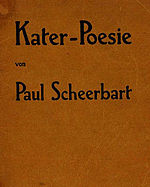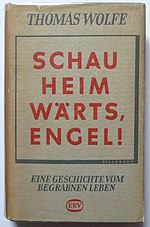Ernst Rowohlt
Ernst Rowohlt (born June 23, 1887 in Bremen , † December 1, 1960 in Hamburg ), with full name Ernst Hermann Heinrich Rowohlt , was a German publisher . In 1908 he founded his publishing house, Rowohlt Verlag , in Leipzig for the first time, and two more publishers were to follow.
Life and publishing
The early years
Ernst Hermann Heinrich Rowohlt was born as the son of the broker Heinrich Rowohlt and his wife Anna Dorothea, b. von Hunteln, born in Bremen in 1887. He had two sisters, Maria and Margarethe. In 1903 he reached the upper secondary level and completed an apprenticeship at the banking house Carl F. Plump & Co. in Bremen after finishing school . He then became a trainee at the Breitkopf & Härtel printing company in Leipzig, the then metropolis of the book trade, where Rowohlt got to know the book printing and bookbinding sectors, among other things . He got the job through the placement efforts of Anton Kippenberg , the director of Insel-Verlag (from 1905 to 1950).
The first Rowohlt Verlag 1908–1912
In 1908 he founded the Rowohlt Verlag Paris-Leipzig, with which he moved to Leipzig in the front building of the Drugulin office at Königstrasse 10 and published his first work, Gustav C. Edzard's Lieder der Sommernächte . In 1909 Rowohlt's second book, Paul Scheerbart's Kater-Poesie, appeared . The first Ernst Rowohlt Verlag also published works by Herbert Eulenberg , Hugo Ball , Max Dauthendey , Georg Heym , Carl Hauptmann , Max Brod , Franz Kafka , Mechtilde Lichnowsky , Hermann Harry Schmitz and Arnold Zweig . Kurt Pinthus and Walter Hasenclever became the publisher's editors . In 1912 Rowohlt and Kurt Wolff separated , who had become a silent partner in July 1910 and who now took over the publishing house. Wolff acquired the publishing rights to Johannes R. Becher , Max Brod, Georg Heym, Franz Kafka and Stefan Zweig for 15,000 marks and renamed the publisher in February 1913 to Kurt Wolff Verlag. In 1913 Rowohlt was an authorized signatory at S. Fischer Verlag and managing director of Hyperion Verlag, Berlin.
At the beginning of the First World War , Rowohlt volunteered for service in the army and remained in active service until the end of the war.
1919-1943
After his return to Berlin he founded the second Rowohlt publishing house, which existed from 1919 to 1943 and in which Paul Mayer and Franz Hessel worked as editors. Important authors in the twenties were Alfons Goldschmidt , Kurt Pinthus , Carl Ludwig Schleich , Franz Blei , Honoré de Balzac , Heinrich Eduard Jacob , Alfred Polgar and Kurt Tucholsky . From 1923 Emil Ludwig became the successful author of the house (including with Napoleon and July 14 ). Since 1928 the publisher has also included contemporary American literature in its program, such as Sinclair Lewis ' Elmer Gantry , Ernest Hemingway's Fiesta or Thomas Wolfes Schau heimwärts, Engel! and Of time and electricity .
At the beginning of the 1930s, the foreign and feuilleton service was added to the business under the direction of Peter Zingler. However, the company ran into financial difficulties, so that two thirds of the shares were transferred to Ullstein Verlag . Through Hans Fallada's successful book Little Man - What Now? , which was filmed in Germany and the USA, the publishing house was able to gain momentum again.
After the National Socialists came to power , 50 percent (46 works) of the available publishing works were banned, confiscated and burned. In 1936 the book Adalbert Stifter by Urban Roedl ( pseudonym for Bruno Adler ) led to Ernst Rowohlt being banned from practicing because the publisher was accused of camouflaging Jewish writers, which was also the case. In 1938 he was expelled from the Reichsschrifttumskammer . His editors Mayer and Hessel emigrated , and the publisher also traveled with his family from Germany via Zurich , Paris , London and Rotterdam to Rio Grande in Brazil . Nevertheless, Rowohlt remained a member of the NSDAP , which he had joined in 1937.
In the meantime, his company was incorporated as a subsidiary of the Stuttgart-based Deutsche Verlags-Anstalt and was continued by his son Heinrich Maria Ledig . Kurt Kusenberg could be published in 1940 with the title La Botella and other strange stories .
Ernst Rowohlt returned to his home country after a 57-day trip at the end of December 1940 on the blockade breaker Rio Grande from Brazil and on February 10, 1941 became a captain in the Wehrmacht in a propaganda company . For this he was first in Greece ( Cape Sunion ). In 1942 he was transferred to the Caucasus front, but had to leave the army at the end of June of the following year because of "political unreliability", since a petition from 1927 for Max Hoelz also had his signature. In 1943, Reichsleiter Amann applied for the company in Stuttgart to be closed.
New start in Stuttgart and Hamburg
The third Rowohlt publishing house was brought back to life in Stuttgart in 1946 when Heinrich Maria Ledig received the publishing license from the Americans to reopen. The first authors were Erich Kästner , Joachim Ringelnatz and Kurt Tucholsky . The magazines Pinguin and story were also published here.
On March 27, Ernst Rowohlt received the license for the publishing house in Hamburg from the English. Four years later the Stuttgart company moved to Hamburg. In the same year the first four editions of the rororo paperback books ( Rowohlt rotation novels ) came out, which should now appear monthly. After a financially threatening phase due to the currency reform in 1948, the publishing house was able to slowly recover.
In the following years works by Wolfgang Borchert , Walter Jens , Dieter Meichsner , Gregor von Rezzori , Arno Schmidt , Ernest Hemingway and Ernst von Salomon were published.
In 1951 Rowohlt suffered his first heart attack, but continued to work in the company. In 1954 he became co-founder and president of the " Knut-Hamsun-Gesellschaft " and three years later he received the Federal Cross of Merit on his 70th birthday . In the same year he received an honorary doctorate from the University of Leipzig .
The publisher was politically active in the DFU .
On December 1, 1960, Ernst Rowohlt died of a heart attack. He was buried in the Volksdorf cemetery. The tombstones of his mother (left) and those of his wife Maria (née Pierenkämper) can also be seen in the photograph.
Marriages
- 1912: with actress Emmy Reye (marriage soon divorced)
- 1921: with the Latvian Hilda Pangust, called Billa
- 1933: with the Brazilian Elli Engelhardt
- 1957: with his long-time lover Maria Pierenkämper
Ernst Rowohlt had three children: Heinrich Maria Ledig-Rowohlt (1908–1992) (who emerged from the connection with the actress Maria Lee (single)), Anna Elisabeth (1930 – approx. 1975), married to Günter Steffens , and Harry Rowohlt (1945-2015).
His eldest son Heinrich Maria Ledig-Rowohlt took over the majority of the shares in the publishing house and continued to manage the company, which had been relocated to Reinbek near Hamburg in 1960 , until 1982. Ernst Rowohlt's younger son Harry worked primarily as an actor and freelance translator .
literature
- Ernst Rowohlt: Ernst Rowohlt in memory of December 1, 1961 . (Appropriated to the friends of Ernst Rowohlt and his publishing house.) Reinbek near Hamburg: Rowohlt 1961.
- Ernst von Salomon : The questionnaire . Hamburg: Rowohlt 1951. (Memoirs of an employee and author)
- Heinrich Maria Ledig-Rowohlt and Hans Georg Heepe (eds.): Rowohlt Almanach 2. 1963–1983 . For the 75th anniversary of the publisher. With a foreword by Otto F. Walter and a complete bibliography of all publications from 1963–1983. Reinbek near Hamburg: Rowohlt 1983, ISBN 3-498-05698-0 .
- Horst Varrelmann (Ed.): Rowohlt Almanach 3. 1983–1992 . With a foreword by Michael Naumann and the complete bibliography of all publications from 1983 (2nd half) - 1992. Reinbek near Hamburg: Rowohlt 1993, ISBN 3-498-05735-9 .
- Mara Hintermeier and Fritz J. Raddatz (eds.): Rowohlt Almanach 1908–1962 . With a foreword by Kurt Pinthus and the complete bibliography from 1908–1961. Reinbek near Hamburg: Rowohlt 1962.
- Paul Mayer : Ernst Rowohlt in personal reports and photo documents. On the occasion of Ernst Rowohlt's 80th birthday on June 23, 1967 . Reinbek near Hamburg: Rowohlt 1967 (special print). 2nd edition as “Rowohlt's Monographs” (edited by Kurt Kusenberg) published in 1968. New edition in 2008 under ISBN 978-3-499-50707-6
- Paul Mayer: Living shadows. From the memories of a Rowohlt lecturer . Reinbek near Hamburg: Rowohlt 1969.
- Walther Kiaulehn : My friend the publisher. Ernst Rowohlt and his time . Reinbek near Hamburg: Rowohlt 1967.
- Hermann Gieselbusch, Dirk Moldenhauer, Uwe Naumann, Michael Töteberg: 100 years of Rowohlt. An illustrated chronicle . Rowohlt, Reinbek 2008, ISBN 978-3-498-02513-7
- Michael Töteberg , Sabine Buck (eds.): Hans Fallada: Ewig auf der Rutschbahn - Correspondence with the Rowohlt Verlag . Rowohlt, Reinbek near Hamburg 2008, ISBN 978-3-498-02121-4
- Volker Hage , David Oels, Klaus Wiegrefe : Captain of Propaganda . In: Der Spiegel . No. 22 , 2008, p. 156-159 ( Online - May 26, 2008 ).
- Hans Georg Heepe: Rowohlt, Ernst. In: New German Biography (NDB). Volume 22, Duncker & Humblot, Berlin 2005, ISBN 3-428-11203-2 , pp. 150-152 ( digitized version ).
Web links
- Literature by and about Ernst Rowohlt in the catalog of the German National Library
- Ernst Rowohlt reports from his life and from his work as a publisher. Hamburg 1959. Film document. Institute for Scientific Film (TIB AV-Portal) doi : 10.3203 / IWF / G-57
Individual evidence
- ^ "Misjudged, slandered, defamed" - Die Zeit, July 30, 1965
- ↑ Photos of the grave Waldfriedhof Hamburg-Volksdorf at knerger.de
| personal data | |
|---|---|
| SURNAME | Rowohlt, Ernst |
| BRIEF DESCRIPTION | German publisher |
| DATE OF BIRTH | June 23, 1887 |
| PLACE OF BIRTH | Bremen |
| DATE OF DEATH | December 1, 1960 |
| Place of death | Hamburg |


